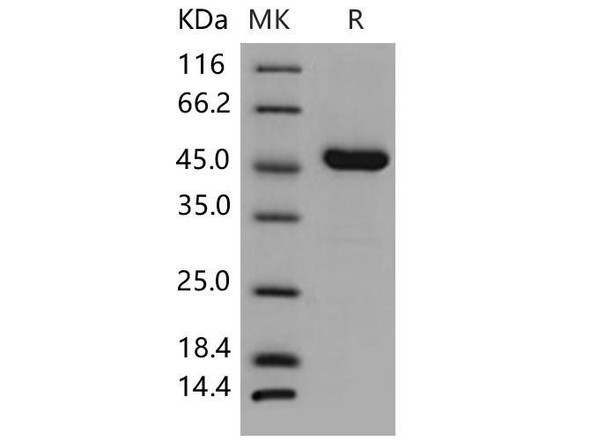Description
| Product Name: | Human RAGE Recombinant Protein |
| Product Code: | RPPB4820 |
| Size: | 10µg |
| Species: | Human |
| Target: | RAGE |
| Synonyms: | Advanced Glycosylation End-Product Specific Receptor, Advanced Glycosylation End Product-Specific Receptor, RAGE, Receptor for Advanced Glycation End-Products Variant 20, Receptor for Advanced Glycosylation End Products, Receptor for Advanced Glycation End-Products, RAGE Isoform NtRAGE-Delta, RAGE Isoform SRAGE-Delta, SCARJ1. |
| Source: | Sf9 Insect cells |
| Physical Appearance: | Sterile Filtered colorless solution. |
| Formulation: | The RAGE solution (0.25mg/1ml) contains Phosphate-Buffered Saline (pH 7.4) and 10% glycerol. |
| Stability: | Store at 4°C if entire vial will be used within 2-4 weeks. Store, frozen at -20°C for longer periods of time. For long term storage it is recommended to add a carrier protein (0.1% HSA or BSA).Avoid multiple freeze-thaw cycles. |
| Purity: | Greater than 90.0% as determined by SDS-PAGE. |
| Amino Acid Sequence: | ADLQNITARI GEPLVLKCKG APKKPPQRLE WKLNTGRTEA WKVLSPQGGG PWDSVARVLP NGSLFLPAVG IQDEGIFRCQ AMNRNGKETK SNYRVRVYQI PGKPEIVDSA SELTAGVPNK VGTCVSEGSY PAGTLSWHLD GKPLVPNEKG VSVKEQTRRH PETGLFTLQS ELMVTPARGG DPRPTFSCSF SPGLPRHRAL RTAPIQPRVW EPVPLEEVQL VVEPEGGAVA PGGTVTLTCE VPAQPSPQIH WMKDGVPLPL PPSPVLILPE IGPQDQGTYS CVATHSSHGP QESRAVSISI IEPGEEGPTA GSVGGSGLGT LALEPKSCDK THTCPPCPAP ELLGGPSVFL FPPKPKDTLM ISRTPEVTCV VVDVSHEDPE VKFNWYVDGV EVHNAKTKPR EEQYNSTYRV VSVLTVLHQD WLNGKEYKCK VSNKALPAPI EKTISKAKGQ PREPQVYTLP PSRDELTKNQ VSLTCLVKGF YPSDIAVEWE SNGQPENNYK TTPPVLDSDG SFFLYSKLTV DKSRWQQGNV FSCSVMHEA HNHYTQKSLS LSPGKHHHHH H |
| Biological Activity: | Measured by the ability of the binding activity in a functional ELISA. The ED50 range ?15ug/ml. |
Advanced Glycosylation End Product-Specific Receptor or RAGE is an immunoglobulin, part of the immunoglobulin transmembrane proteins family. RAGE moderates �interactions between advanced glycosylation end products, also known as AGE. These signaling has a crucial part in the regulation of TNFalpha,oxidative stress, endothelial dysfunction in type 2 diabetesproduction and expression. RAGE helps the translocation of ABPP (amyloid-beta peptide) through the membrane of cells to the intracellular area in the cortical neurons.
RAGE Human Recombinant produced in Sf9 Baculovirus cells is a single, glycosylated polypeptide chain containing 561 amino acids (24-342 a.a) and having a molecular mass of 61.2kDa. RAGE is fused to a 242 amino acid hIgG-His-tag at C-terminus & purified by proprietary chromatographic techniques.
| UniProt Protein Function: | RAGE: Mediates interactions of advanced glycosylation end products (AGE). These are nonenzymatically glycosylated proteins which accumulate in vascular tissue in aging and at an accelerated rate in diabetes. Acts as a mediator of both acute and chronic vascular inflammation in conditions such as atherosclerosis and in particular as a complication of diabetes. AGE/RAGE signaling plays an important role in regulating the production/expression of TNF- alpha, oxidative stress, and endothelial dysfunction in type 2 diabetes. Interaction with S100A12 on endothelium, mononuclear phagocytes, and lymphocytes triggers cellular activation, with generation of key proinflammatory mediators. Interaction with S100B after myocardial infarction may play a role in myocyte apoptosis by activating ERK1/2 and p53/TP53 signaling. Receptor for amyloid beta peptide. Contributes to the translocation of amyloid-beta peptide (ABPP) across the cell membrane from the extracellular to the intracellular space in cortical neurons. ABPP-initiated RAGE signaling, especially stimulation of p38 mitogen-activated protein kinase (MAPK), has the capacity to drive a transport system delivering ABPP as a complex with RAGE to the intraneuronal space. Interacts with S100B, S100A1 and APP. Interacts with S100A12. Endothelial cells. 4 isoforms of the human protein are produced by alternative splicing. |
| UniProt Protein Details: | Protein type:Membrane protein, integral; Motility/polarity/chemotaxis; Receptor, misc.; Cell cycle regulation Chromosomal Location of Human Ortholog: 6p21.3 Cellular Component: integral to plasma membrane; extracellular region; plasma membrane Molecular Function:identical protein binding; protein binding; transmembrane receptor activity; receptor activity Biological Process: cell surface receptor linked signal transduction; response to wounding; innate immune response; inflammatory response; neurite development; induction of positive chemotaxis; activation of NF-kappaB transcription factor |
| NCBI Summary: | The advanced glycosylation end product (AGE) receptor encoded by this gene is a member of the immunoglobulin superfamily of cell surface receptors. It is a multiligand receptor, and besides AGE, interacts with other molecules implicated in homeostasis, development, and inflammation, and certain diseases, such as diabetes and Alzheimer's disease. Many alternatively spliced transcript variants encoding different isoforms, as well as non-protein-coding variants, have been described for this gene (PMID:18089847). [provided by RefSeq, May 2011] |
| UniProt Code: | Q15109 |
| NCBI GenInfo Identifier: | 2497317 |
| NCBI Gene ID: | 177 |
| NCBI Accession: | Q15109.1 |
| UniProt Secondary Accession: | Q15109,Q15279, Q3L1R4, Q3L1R5, Q3L1R6, Q3L1R7, Q3L1R8 Q3L1S0, A2BFI7, A6NKF0, A7Y2U9, B0V176, |
| UniProt Related Accession: | Q15109 |
| Molecular Weight: | 41,098 Da |
| NCBI Full Name: | Advanced glycosylation end product-specific receptor |
| NCBI Synonym Full Names: | advanced glycosylation end product-specific receptor |
| NCBI Official Symbol: | AGER�� |
| NCBI Official Synonym Symbols: | RAGE�� |
| NCBI Protein Information: | advanced glycosylation end product-specific receptor; RAGE isoform sRAGE-delta; RAGE isoform NtRAGE-delta; receptor for advanced glycation end-products variant 20 |
| UniProt Protein Name: | Advanced glycosylation end product-specific receptor |
| UniProt Synonym Protein Names: | Receptor for advanced glycosylation end products |
| Protein Family: | Advanced glycosylation end product-specific receptor |
| UniProt Gene Name: | AGER�� |
| UniProt Entry Name: | RAGE_HUMAN |






